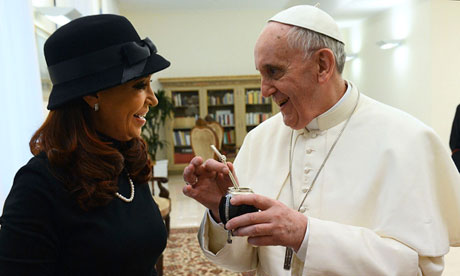Didn’t take her long (Guardian):
Cristina Fernández de Kirchner says she requested pontiff’s intervention in dispute with UK over South Atlantic islands
The Argentinian president wasted no time in bringing up the divisive issue of the Falkland Islands when she met with her compatriot Pope Francis as he prepared for his inaugural papal mass.
After they lunched together, Cristina Fernández de Kirchner told a press conference in Rome: “I asked for his intervention to avoid problems that could emerge from the militarisation of Great Britain in the South Atlantic. We want a dialogue and that is why we asked the pope to intervene: so that the dialogue is successful.”
Britain reacted strongly to this attempt to involve the new pope in mediating in the increasingly tense dispute.
The UK ambassador to the Vatican, Nigel Baker, said: “The Holy See’s position on the Falkland Islands has for some time been that it is a matter between two sovereign states and that the Holy See does not have a role to play. We expect that position to continue.”
Fernández was one of many heads of state flying into Rome for Francis’s inaugural papal mass on Tuesday. They included Zimbabwe‘s president,Robert Mugabe, who has repeatedly dodged a European travel ban by visiting the Vatican and the UN’s Rome-based Food and Agriculture Organisation.
Taiwan’s president, Ma Ying-Jeou, also made a rare European excursion to the only state on the continent with which it still has full diplomatic relations.
The most historically significant attendance will be that of Bartholomew I, the spiritual leader of the world’s Orthodox Christians. His presence at the installation of Pope Francis will be the first by an ecumenical patriarch since before the Great Schism in 1054.
In the week of the enthronement of the Archbishop of Canterbury, Britain sent a modest delegation. The Duke of Gloucester will represent his cousin, the Queen. Ken Clarke, minister without portfolio, and Lady Warsi, the minister for Faith and Communities, will be there on behalf of the government.
Both Fernández and the new pope did their best to bring some warmth to a relationship that was notably frosty when he was still archbishop of Buenos Aires. She gave Francis a gourd and straw with which to prepare the traditional South American infusion, mate. He responded with a kiss.
“Never in my life has a pope kissed me,” Fernández said afterwards. It was a far cry from last year when the then Cardinal Jorge Mario Bergoglio declared that Argentina under her leadership was suffering from demagoguery, totalitarianism and corruption. She, at the time, described his attitudes as reminiscent of the middle ages and the inquisition.
Fernández and her late husband, Nestor Kirchner, who preceded her in office, have ignored Catholic teaching to introduce a series of measures such as the legalisation of same-sex marriages in 2010. A source close to her administration said of Bergoglio’s election as pope: “The government has been split over how to react.”
Francis’s status as the first Latin American pope has appealed to nationalists across the region, including left-wing leaders such as acting president Nicolás Maduro of Venezuela, Rafael Correa of Ecuador and Leonardo Boff, a key figure in Brazil’s Liberation Theology movement. “Cristina is worried that we cannot swim against the tide of affection,” said the source.
In Rome, Fernández cited the precedent of Pope John Paul II’s mediation in a potentially explosive territorial dispute between Chile and Argentina in 1978.
Pope Francis’s views on the Falklands dispute are the same as those of almost all Argentinians. At a mass last year to mark the 30th anniversary of the war, he said Argentina’s troops had gone to the islands “to claim the country that is theirs”. He described the Falklands as “usurped”.
Britain has rejected Fernández’s call for negotiations on sovereignty. This month all but three of the 1,518 islanders who voted in a referendum endorsed the prospect of the islands keeping their status as a UK overseas territory.
At least 132 delegations are expected at the pope’s inaugural mass. Italian media reports said the civil protection authorities were making provision for more than a million attendees.
In Buenos Aires, there are clear signs that the government wants to narrow its distance from the new pope. Posters have gone up around the city with portraits of Francis and the slogan “The new pope is Latin American and Peronist.”
